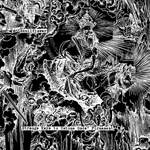|
|
 |
Dusted Reviews
Artist: Skullflower Album: Strange Keys to Untune Gods’ Firmament Label: Neurot Review date: Feb. 5, 2010 |

|
|
|
 |
Back in the early 1990s, Skullflower emerged from the Broken Flag noise label as a hybrid creation, part noise and part rock. After a membership split, leader Matthew Bower led the group more toward the rock side of things, albeit with a sludge factor that kept them far from the attention of the masses. Albums like IIIrd Gatekeeper and Transformer were among the heaviest, densest rock around, equal parts molasses riffs and walls of fuzz. In 1996, Bower offered the mysteriously divergent album This Is…, a surprisingly gorgeous tapestry of drones and mysterious sonics, and then Skullflower seemingly was no more. Bower focused on other projects such as Total and Sunroof!, and it appeared that we would have no more Skullflower.
It was quite a surprise, then, when 2003 saw a new album, Exquisite Fucking Boredom. Not exactly a return to form, that album not surprisingly reflected the intervening years’ ironwork. From dirge-like riffs to doom-laden drones, it almost mapped a path from form to formlessness.
Since then, Bower has kept his feet firmly in the great river of drone, eschewing the rock foundations from which Skullflower sprang. Strange Keys to Untune Gods’ Firmament offers two discs of sky- and earth-shattering tones, harsh walls of guitar fuzz layered into a glacial movement of sound. From the opening "Shivering Aurora," it’s all static hiss and squealing strings, like a hundred guitars being stepped on at once — with a distortion pedal, of course. A few of the tracks lay back a bit more, and on "Gateway to Blasphemous Light," there’s a somehow shinier aspect. It’s still a full sound, but you can discern individual strands of sound amidst the mass.
Disc two is more of the same, starting from "Nibelungen," a subdued cacophony of layered guitar buzz and factory-floor ambience, filled with crashing and crunching. Through to the end, the disc provides a steady diet of intense peaks, whirlwinds of hissing, sizzling feedback and swirling, screaming tones amidst murky low-end drone.
If one were to take a Glenn Branca guitar symphony and feed all of the players through different fuzz and distortion pedals, the results might approximate Strange Keys. On first listen, it’s hard to appreciate, and even on later listens, I can’t help but feel that two discs of this backfires a bit — while the length lets things stretch out, and you can really let yourself fall into the flow, it illustrates the amorphous nature of the sounds. There is flow here, but not progress. The tracks do differ, but not so substantially that you couldn’t substitute one for the other: there’s no development that follows from one to the next.
That’s not to say that development is necessary, but I still found myself wishing for more of a sense of progress. While sometimes it is about the journey, not the destination, two hours of journey is still better off with some pit stops along the way.
By Mason Jones
|







